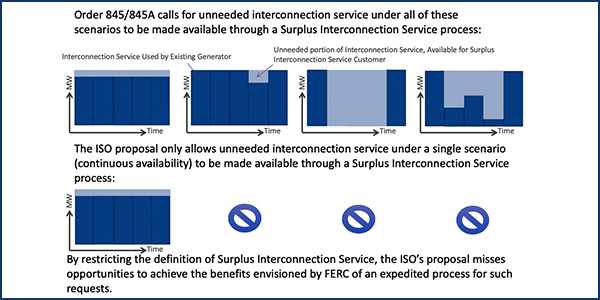New England Power Pool participants seem to be in “overall agreement” with ISO-NE’s approach to finalizing compliance with FERC Order 845, the RTO’s director of transmission strategy and services, Al McBride, told the NEPOOL Transmission Committee on April 28.
One lingering difference is related to participants’ concerns about the dynamic between New England’s capacity network resource interconnection service (CNRIS) and network resource interconnection service (NRIS), McBride said.
The TC was discussing ISO-NE’s April 20 request for clarification filed with FERC regarding Order 845 compliance, as well as the RTO’s proposed response in terms of Tariff language (ER19-1951).
Order 845, approved in April 2018, set pro forma minimum standards for large generator interconnection procedures and agreements.
FERC rejected the RTO’s proposed rules for obtaining surplus interconnection service (SIS). The commission on March 19 only partially accepted an Order 845/845-A compliance filing by ISO-NE and New England Transmission Owners (NETOs), ordering a further compliance filing within 120 days. (See FERC OKs NETOs, Emera Maine Order 845 Filings.)
Further changes will become effective March 19 once accepted by the commission, with a further compliance filing required by July 17, McBride said in presenting the RTO’s plans.
The TC will review the Tariff changes again on May 27 ahead of a planned vote by the Participants Committee at its summer meeting in June.
Narrower Approach
NEPOOL counsel Eric Runge said the organization reviewed ISO-NE’s April 20 request for clarification and contacted RENEW Northeast, which proposed the amendments that prompted NEPOOL to file its alternative and submit a protest last May.
“The only remaining issue here is surplus interconnection service,” said Susan Muller of Boreas Renewables, presenting RENEW’s analysis on SIS, the subject of which was last brought before the TC a year ago. (See NEPOOL Rebuffs ISO-NE on ‘Surplus’ Interconnection.)
[Note: Although NEPOOL rules prohibit quoting speakers at meetings, those quoted in this article approved their remarks afterward to clarify their presentations.]
RENEW says the RTO’s request appears to eliminate all, or nearly all, SIS eligibility. It asked that NEPOOL clarify for the commission “that the identification of the need for any additional interconnection facilities should not cause the end of the expedited process, because interconnection facilities are typically needed and this would prematurely end the analyses for most, if not all, SIS requests.”
Runge is writing a brief response to the RTO’s request that would address both the amount of SIS available from an NRIS resource, and the expedited process and language regarding interconnection facilities, he said.
The commission rejected the RTO’s proposed definition as it related to NRIS customers being limited to permanent service as opposed to periodic or other limited service.
Muller pointed out that while all generators have NRIS for provision of energy, only resources that have obtained a capacity supply obligation have CNRIS for provision of capacity.
She said Runge had a good suggestion in seeking some additional clarification from the RTO about when a resource has both NRIS and CNRIS, as “the relationship between those becomes very important in the context of surplus service.”
“It’s really important that there’s clarity about the fact that these two services coexist,” Muller said. “What we’re really talking about is: Can two devices or two resources share NRIS when one of them also has CNRIS?”
Liz Delaney, director of wholesale market development for Borrego Solar, supported the RENEW proposal.
“My company is developing a lot of hybrid resources, and we’re entering into this world where we’re going to need clarity on these issues soon,” Delaney said.
NETOs Settlement Close
The NETOs are nearing settlement with FERC staff and municipally owned power companies on pool transmission formula rates, with a commission administrative law judge on April 22 having ordered the hearing in abeyance until early June because of the COVID-19 pandemic.
On behalf of the NETOs, Eversource Energy’s director of transmission rates and revenue requirements, Lisa Cooper, presented an update on the regional network service (RNS) settlement proceeding initiated by the commission in 2015 (EL16-19).
The commission determined that transmission formula rates appear to be unjust and unreasonable, as they may be insufficiently specific with respect to calculation of some components.
Reporting for the Participating Transmission Owners Administrative Committee, Cooper said the commission argued that the RNS formula rate (Attachment F) may not be synchronized with local network service formula rates of individual transmission owners, which could potentially lead to over-recovery of costs.
The original settlement filed on Aug. 17, 2018, was opposed by FERC trial staff and contested by municipal TOs, and the commission rejected the settlement on May 22, 2019.
The parties reached agreements in principle in October 2019, and all parties are in the process of reviewing settlement documents and redline tariff changes, Cooper said.




